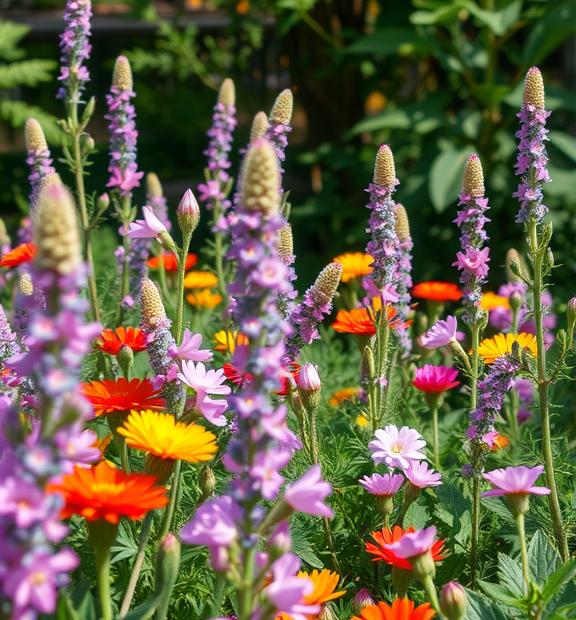Transforming Your May Garden: Tips for Seasonal Planting and Care
As the month of May arrives, it brings the promise of blooming flowers and thriving greenery. This is the perfect time to transform your garden into a vibrant space filled with color and life. Whether you’re an experienced gardener or just starting, this guide will help you understand the best practices for seasonal planting and care in your May garden.
Choosing the Right Plants
When selecting plants for your May garden, it’s essential to consider your local climate and soil type. Some great options include:
- Annuals: Plants like petunias and marigolds are not only colorful but also easy to care for.
- Perennials: Consider varieties like daylilies or coneflowers, which will return year after year.
- Vegetables: Early crops like tomatoes, peppers, and cucumbers thrive in the warmer May temperatures.
- Herbs: Basil, parsley, and chives can flourish and enhance your culinary creations.
Preparing Your Soil
Healthy soil is the foundation of a thriving garden. To prepare your soil:
- Clear Debris: Remove any dead plants or weeds from the previous season.
- Till the Soil: Loosen the soil with a garden fork or tiller to improve aeration.
- Add Nutrients: Enrich the soil with compost or well-rotted manure for better growth.
Testing your soil’s pH can also help you understand what nutrients it may lack. Kits are widely available at garden centers, making it easy for you to assess your soil’s health.
Planting Techniques
When planting in your May garden, pay attention to spacing and depth:
- Follow Spacing Guidelines: Each plant has specific spacing requirements; crowded plants will compete for sunlight and nutrients.
- Plant at the Right Depth: Ensure you’re planting seeds and seedlings at the appropriate depth for optimal growth.
- Water Gently: Water your plants lightly right after planting to reduce shock.
Watering and Maintenance
The warm May sun can lead to quicker evaporation, making regular watering essential. Here are some tips:
- Water Deeply: Aim to water deeply but less frequently, allowing roots to grow robustly.
- Early Morning Watering: Watering early in the day reduces evaporation and provides plants with moisture for the heat of the day.
Additionally, mulch around your plants helps retain moisture and suppresses weeds. Organic options like straw or bark chips work well.
Pest Management
Love what I do? Be a hero and help me keep creating awesome content!
Support My Mission Now!Every donation fuels more great stuff – thank you, legend!
As plants flourish, they can attract unwanted pests. Prevention is key:
- Regular Inspection: Check your plants often for signs of pests or disease.
- Encourage Beneficial Insects: Attract ladybugs and lacewings to control aphid populations.
- Use Natural Remedies: Consider using neem oil or insecticidal soap for organic pest control.
Seasonal Cleanup
As the month progresses, continue cleaning up your May garden. Keep an eye on wilting flowers or any plants that may have finished blooming. Regular deadheading encourages new growth and keeps your garden looking its best.
Enjoying Your Garden
Love what I do? Be a hero and help me keep creating awesome content!
Support My Mission Now!Every donation fuels more great stuff – thank you, legend!
May is not just about hard work in the garden; it’s also about enjoying your labor. Consider setting up a cozy seating area where you can take in the sights and sounds of your blooming garden. Enjoy quiet moments surrounded by nature, perhaps with a book or a cup of tea. Sharing your garden with friends and family can create joyful memories and inspire others to appreciate the beauty of gardening.
This transformative month provides the perfect opportunity to cultivate your May garden with vibrant plants, great care techniques, and an attentive mindset. By following these tips, you will not only ensure a flourishing garden but also enjoy the therapeutic benefits of gardening as spring transitions into summer.
The Importance of Pollinators in Your Spring Garden Design
When planning your spring garden, think about the tiny creatures that play a huge role in its success: pollinators. These essential beings, including bees, butterflies, and hummingbirds, help your plants produce fruit, seeds, and vibrant blooms. By incorporating pollinators into your garden design, you promote biodiversity and establish a healthy ecosystem.
Love what I do? Be a hero and help me keep creating awesome content!
Support My Mission Now!Every donation fuels more great stuff – thank you, legend!
Pollinators are crucial because they are responsible for about one in every three bites of food that we eat. Beyond that, they help your flowers produce fruits and seeds, contributing to your garden’s beauty and vitality. Including pollinator-friendly plants in your design ensures a thriving environment for these creatures. Here’s a list of popular pollinator plants you should consider:
- Sunflowers
- Lavender
- Echinacea (Coneflower)
- Milkweed
- Bee Balm
- Daylilies
- Marigolds
- Zinnias
When selecting plants, opt for a variety of colors, shapes, and sizes. This diversity not only attracts different types of pollinators but also enhances the visual appeal of your spring garden. Choose native plants whenever possible, as they have evolved to thrive in your local environment and are more appealing to local pollinators.
Love what I do? Be a hero and help me keep creating awesome content!
Support My Mission Now!Every donation fuels more great stuff – thank you, legend!
As you create your garden, consider the layout too. A well-planned design encourages pollinator activity. Grouping plants in clusters makes them easier for pollinators to find and navigate. Here’s how you can effectively group your plants:
- Cluster a few of the same kind of flower together for easy access.
- Pair taller plants with shorter ones to create a layered effect.
- Consider planting in blocks or drifts rather than single rows.
Water is also essential for pollinators. Provide a shallow water source, such as a small birdbath or a shallow dish filled with pebbles. Ensure the water is fresh and accessible without being too deep, as pollinators can easily drown in deeper water. Adding rocks or floating sticks can help them safely sip and refresh themselves.
In addition to providing food and water, create shelters for your important little helpers. This could be as simple as leaving some areas of your garden a bit wild or building bee hotels. Leaf litter and brush piles also offer great hiding and nesting places for solitary bees and butterflies. By including these natural elements, you support the life cycles of your pollinators.
One common mistake in garden design is the use of pesticides and chemicals. These substances are harmful to pollinators and should be avoided. Instead, promote natural pest control by encouraging beneficial insects like ladybugs and lacewings. Use organic methods to keep your garden healthy and safe for all creatures.
Timing is equally important when considering pollinators in your garden. Different plants bloom at different times, so plan for a continuous cycle of flowering plants from early spring to late fall. This ensures that there’s always food available for pollinators, keeping them around your garden throughout the growing season. Here are some examples of plants that bloom at different times:
- Early Spring: Crocus, Snowdrops
- Late Spring: Lilacs, Iris
- Summer: Black-eyed Susans, Shasta Daisies
- Fall: Asters, Sedums
Marketing your garden to local pollinators can also add community value. Educate neighbors about the importance of supporting pollinators and encourage them to create their own pollinator gardens. You can even join local gardening clubs or participate in community projects that focus on wildlife preservation and pollinator protection.
Your spring garden design is not just about aesthetics. By prioritizing pollinators, you’re nurturing a vital aspect of our ecosystem. These efforts contribute to cleaner air, enhance biodiversity, and support essential food production. So as you dig into your spring gardening projects, remember the power of pollinators and why they matter. Happy gardening!
Conclusion
As the vibrant month of May unfolds, your garden becomes a canvas for growth and renewal. By embracing the tips for seasonal planting and care, you can cultivate a lush, thriving outdoor environment that showcases a harmonious blend of colors and textures. This month presents unique opportunities to plant various flowers, vegetables, and herbs, ensuring your garden flourishes as the weather warms.
Equally vital is the role of pollinators in your spring garden design. By incorporating attractive plants that draw bees, butterflies, and other beneficial insects, you not only enhance the beauty of your space but also significantly boost its productivity. Pollinators are essential for the health of your plants, leading to fruitful fruits and bountiful blooms.
Love what I do? Be a hero and help me keep creating awesome content!
Support My Mission Now!Every donation fuels more great stuff – thank you, legend!
With the right plants selected and a welcoming atmosphere for pollinators established, you’re on your way to creating a May garden that flourishes in every detail. Finding the balance in planting and care, alongside nurturing the crucial pollinator population, will result in a vibrant, stunning landscape that you can enjoy year after year.
So grab your gardening tools, embrace the joy of planting this May, and watch as your outdoor space transforms into a sanctuary of life and beauty. Each step you take, from selecting the right seeds to caring for your plants, contributes to a thriving ecosystem in your yard. Enjoy the journey of gardening this month, fully embracing what nature has to offer as you create a captivating and productive May garden.

